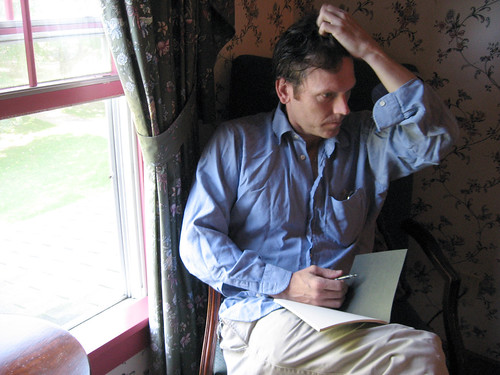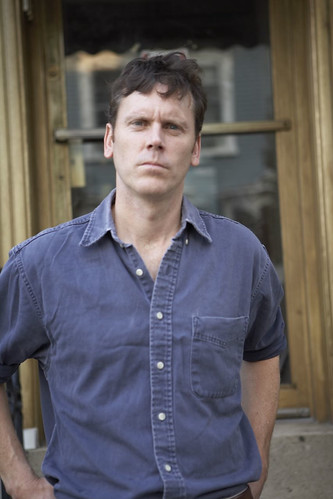
Playwright Will Eno. Photo below by Farzad Owrang.
Recently I had the pleasure of conducting an email interview with playwright Will Eno, whose Lady Grey (in ever lower light) and other plays closes this weekend at Cutting Ball Theater.
Read the interview in the San Francisco Chronicle here.
There was more interview than there was room in the newspaper, so please enjoy the rest of the brilliant Mr. Eno’s responses.
Q: Dogs tend to pop up in your work, or more specifically, the deaths of dogs. Does this mean you’re a dog lover or the opposite?
A: I am solidly and proudly a dog lover. I even sometimes think of this as an enlightened position, a paradoxically humane approach to the world. Other times, though, I worry that I love dogs because I love to imagine a world in which there are only about three total feelings and three total needs, and it never gets more complicated than that. “Yes, I want to go for a walk. Yes, I’m hungry. Yes, thank you, I would like to climb up on your leg. Now, if you’ll excuse me, I’m going to go around in circles and then fall asleep until I wake up barking and run over to the door.” The great dogs in my life have made me feel like I’m a good and trustworthy person. They allow you to live on or near an essential level that is just fairly basic and stable needs, and once those are taken care of, it’s all cats and shiny hubcaps and tennis balls.
Q: Mr. Theatre nods in the direction of Shakespeare and the “Seven Ages of Man” speech from As You Like It. What in your canon do you think might inspire a nod from Mr. Shakespeare (given we could overcome his inconvenient death)?
A: The good thing about this is that we can’t overcome his death, convenient or not, and so the level of abstraction here is high enough that I won’t worry about seeming arrogant by even trying to answer. I could possibly imagine him hearing Thom Pain’s line to someone in the audience, “I have that same shirt,” and thinking, “Hey, that’s not a bad way to accomplish the thing that just got accomplished.” Another one might be a line in my play The Flu Season where, after one narrator has narrated a scenario in which a lot of terrible stuff is about to be reversed and erased by a change of setting, the change of setting does not occur, the terrible stuff continues, and the other narrator says, coldly and flatly, “Oops.”
Q: Do people ever think you’re Brian Eno and then get mad when your plays turn out not to be Music for Airports concerts?
A: It happens less and less that someone will ask if I’m related to Brian Eno, and I regard this as a bad sign for the culture at large. I just found out about a month ago, there is a small chance that we are, very distantly, related. I believe we both travel under a misspelled version of a French name, “Henault.” Mine was changed about five generations ago when some relatives who couldn’t spell came down from Canada. I don’t know what his story is. He’s someone I really admire. He has a kind of genius that expresses itself both at the very scientific level and, as well, at the level of the lullaby.

Q: When Berkeley Rep produced your TRAGEDY: a tragedy in 2008 I recall audiences having extremes in their reactions, from thinking it was hilarious and brilliant to walking out mid-performance. How much does the audience’s experience with your work matter to you?
A: It means a lot, good or bad, when you’re sitting right there. But then time passes. That play, to me, is about death and anxiety and how we try to talk about unspeakable things. Also, around the time I was starting writing it, my mom was having terrible insomnia for the first time in her life, and I was feeling a lot of sympathy for how lonely and scary a night can be to some people. Those are the memorable things. As for my response to people’s responses, there’s not tons of nuance there – it hurts when people hate something, and feels good when they like it, but it’s good to remember you’re not owed either response. I loved that cast and loved working with Les Waters and Berkeley Rep and thought the production was really great. So I’m pretty sure that the people who hated it, hated what I wrote and how I wrote it, and not anything else, which is not exactly a good feeling, but at least a very clear one. It’s good to try to accept that thoughtful and intelligent and decent people might really hate what you do.
Q: If you could go to a show with any of the characters in these short plays – Lady Grey, Mr. Theatre, Mr. and Mrs. Smith or Jack and Jill – who would it be and why?
A: That’s an interesting question. I tend to resist giving that particular kind of reality to characters I’ve written, partly because I’m happy enough with the reality they achieve within a theatrical production and partly because it always seems weird to me when playwrights do that. But since you ask, it would probably be one of the women. Romulus Linney, who was a good good guy, and who just died over the winter, has a beautiful short play called F.M. I can’t think of the name of the main female character, but, she very much comes to mind as a fictional character I’d like to meet. I don’t know if we’d go to a play, though. Maybe we’d see some music or go to an aquarium.
Q: You’ve been compared to all kinds of people, from Samuel Beckett to Jon Stewart to Thornton Wilder. How would you describe what you do and how you do it to a non-theater-going person?
A: I try not to get too carried away with the comparisons, as I understand that we all need the convenience of a category, a point of reference. Think of how many incredibly different things are described by us saying, “It’s like riding a bike.” I don’t know why I thought of this, but, my cousin James said to me, about the character Thom Pain, after seeing the production in New York, “At first, I didn’t trust that guy. And then, I completely trusted that guy.” That always made me feel good. I would like to describe what I do by saying that I’m trying to create trust against terrible and even impossible odds, and then allow for something great and new to happen within that field of trust. That’s probably a little highfalutin or overreaching, but, hey, so shoot me, I’m highfalutin. Truly, I don’t think I’m up to anything too mysterious, or esoteric. I think it’s just something about trying to create or allow for the audience a certain sequence of feelings. I think the thing is to change the speed of life a little, speed it up or down, and put some felt and relevant words in the air, so that we can see it a little differently, and, my great hope would be, love it more, care for it more. Speaking of comparisons, here’s a good one. I was once visiting my great aunt in a nursing home. I’d just had my appendix out and weighed about 20 pounds less than I usually did, and she asked to see the scar. When I lifted my shirt and showed her, she said, “Look at you. You’re like Christ.” I didn’t know if she meant the scar, or, that I’d come to visit, or what. It turned out she thought I was too skinny. I like the idea of the word Christlike being used solely in reference to someone’s physique.
FOR MORE INFORMATION
Lady Grey (in ever lower light) and other plays continues through April 10 at EXIT on Taylor, 277 Taylor St., San Francisco. Tickets are $15-$30. Call 800-838-3006 or visit cuttingball.com for information.
